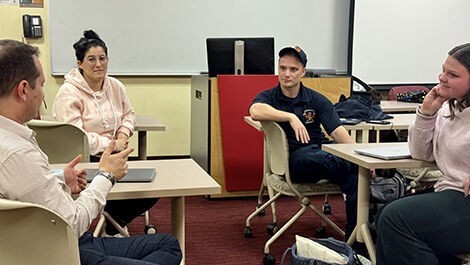
In every single course, you have to take the analytical and textbook material and go into your career and apply them in ways that are beneficial. I think the MPA program in general does a really good job of that.
When Kara McManus, G’26, pursues a career as a government or nonprofit administrator, she will inevitably partner with various consultants. Thanks to an innovative BSU initiative, she’ll do so with lots of first-hand experience.
This semester, Kara and her classmates in a nonprofit administration course are helping SouthCoast Community Foundation build a database of nonprofits in the region.
“This was my first time working on a client-based project,” said Kara, who noted the broad scope was initially overwhelming. “This was the first experience I had trying to ask the right questions on how we can narrow this down but still provide a service that is going to be beneficial.”
Their project, which is part of BSU’s Collaborative University Business Experiences (CUBEs) program, will help the foundation assess the philanthropic needs in the region and better distribute funding.
Launched in 2020 by the Ricciardi College of Business, CUBEs pairs classes with organizations for semester-long projects. The initiative has expanded across the university, having now involved more than 1,500 students and more than 100 projects.
“We’ve seen growth in skills that help students in the job market, and they are more engaged in the classroom,” said Dr. Stephanie Jacobsen, an associate professor of marketing and a CUBEs coordinator. “They don’t just show up, watch a lecture and go home. They know they have a hands-on, real project.”
The program benefits both businesses and nonprofits who receive assistance with a project they may not be able to complete in-house.
“It definitely connects to Bridgewater’s commitment to the community as well as our commitment to our students,” said Dr. Seth Meyer, an associate professor of political science and a CUBEs coordinator. “It’s not a zero-sum game.
CUBEs projects provide a safe space where students can take risks and learn from mistakes, said Meyer, who teaches the nonprofit administration class.
Meyer’s students said this style of learning is emblematic of the public administration program, where professors challenge students to connect academic theories to practical applications.
“In every single course, you have to take the analytical and textbook material and go into your career and apply them in ways that are beneficial,” Kara said. “I think the MPA program in general does a really good job of that.”
Do you have a BSU story you'd like to share? Email stories@bridgew.edu.